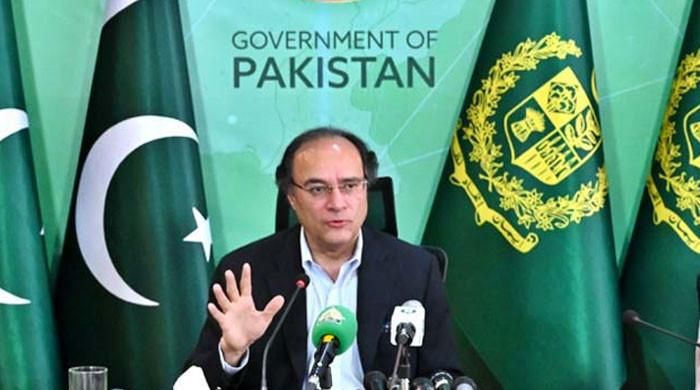- Aurangzeb says Pakistan needs to ensure structural reforms.
- He says the new agreement with the IMF will help achieve macroeconomic stability.
- Pakistan and IMF reach agreement on three-year $7 billion aid package.
ISLAMABAD: Finance Minister Muhammad Aurangzeb said on Saturday that the newly signed bailout agreement with the International Monetary Fund (IMF) will help achieve macroeconomic stability.
The finance minister made the remarks after the cash-strapped country reached an agreement with the Washington-based institution for a three-year, $7 billion aid package, giving a much-needed respite to the struggling economy.
Aurangzeb said that under the programme “we need to ensure structural reforms and achieve self-sustainability in areas of public finance, energy and state institutions,” which he hoped to achieve in the coming years.
The new lending programme, which must be approved by the Fund's Executive Board, should enable Pakistan to “consolidate macroeconomic stability and create conditions for stronger, more inclusive and resilient growth,” the IMF said in announcing the agreement.
Chronically mismanaged, Pakistan's economy has been pushed to the brink, hit by the COVID-19 pandemic, the fallout from the war in Ukraine and supply constraints that fueled inflation, as well as record flooding that affected a third of the country in 2022.
With its foreign currency reserves dwindling, the cash-strapped nation found itself in a debt crisis and was forced to turn to the IMF, securing its first emergency loan in the summer of 2023.
The latest bailout, coming to Pakistan in the form of loans, follows a government commitment to implement reforms, including a major effort to broaden the country's tax base.
In a nation of more than 240 million people and where most jobs are in the informal sector, only 5.2 million people filed income tax returns in 2022.
During the 2024-25 fiscal year, which begins July 1, the government aims to collect nearly $46 billion in taxes, a 40% increase from the previous year.
As part of the initiative, the Federal Board of Revenue (FBR) blocked 210,000 SIM cards of users who had not filed tax returns to expand the income bracket earlier this month.
Pakistan has begun talks with the lender for the new multi-billion-dollar loan deal — its 24th bailout in more than six decades — to support its economic reform program.
Although around 40% of the population already lives below the poverty line, the World Bank said in April it feared 10 million more Pakistanis could fall below that threshold.
Islamabad also aims to reduce its fiscal deficit to between 1.5% and 5.9% next year, meeting another key IMF demand.
The latest loan — a nine-month, $3 billion deal with the IMF — proved to be a lifeline.
But the condition was that unpopular austerity measures be adopted, including the end of subsidies that cushion costs for consumers.
In recent months, the current account balance has recovered slightly, high inflation is just beginning to ease, but Pakistan's external debt remains very high at $242 billion.
According to the IMF, its maintenance will consume half of government revenues in 2024.
The Fund also expects growth of 2% this year, with inflation still projected to reach almost 25% year-on-year, before gradually easing in 2025 and 2026.












